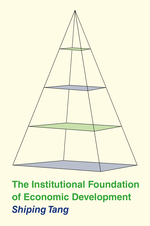About the lecture

Institutions matter for economic development. Yet despite this accepted wisdom, new institutional economics has yet to provide a comprehensive look at what constitutes the institutional foundation of economic development.
Bringing together findings from a range a fields, from development economics and development studies to political science and sociology, The Institutional Foundation of Economic Development, professor Shiping Tang's newest book, explores the precise mechanisms through which institutions affect growth.
Shiping Tang contends that institutions shape economic development through four “Big Things”: possibility, incentive, capability, and opportunity. From this perspective, the institutional foundation of economic development has six major dimensions: political hierarchy, property rights, social mobility, redistribution, innovation protection, and equal opportunity.
Tang further argues that the institutional foundation of economic development is only one pillar within the New Development Triangle: sustained economic development also requires strong state capacity and sound socioeconomic policies.
How to participate?
Please sign up by following the link below to the form on Nettskjema for either in person or virtual participation.
About Shiping Tang
Professor Shiping Tang holds the position of Fudan Distinguished Professor and Dr. Seaker Chan Chair Professor at, Fudan University, Shanghai, China.
He also holds a “Chang-Jiang/Cheung Kong Scholar” Distinguished Professorship from the Chinese Ministry of Education, the highest honor a social scientist can hold in China.
He has a very broad research interest and has published widely, covering international relations, comparative politics, institutional economics, methodology, philosophy of the social sciences, political theory and sociology.
He has also developed powerful platforms for complex decision making based Computational Social Sciences (CSS). He has published five single-authored volumes so far.
His more recent two books include: The Institutional Foundation of Economic Development, (Princeton University Press, 2022) and On Social Evolution: Phenomenon and Paradigm (Routledge, 2020). His The Social Evolution of International Politics (Oxford University Press, 2013), received the International Studies Association (ISA) “Annual Best Book Award” in 2015.
He was the first Chinese and Asian (actually, the first non-Western) scholar to receive this prestigious book award. He is also the author of A Theory of Security Strategy for Our Time: Defensive Realism (Palgrave Macmillan 2010), A General Theory of Institutional Change (Routledge, 2011 hardcover, paperback 2013), and many articles in leading international journals.
You can read more about his recent book here:
